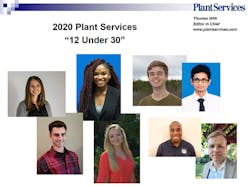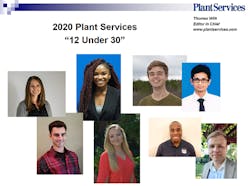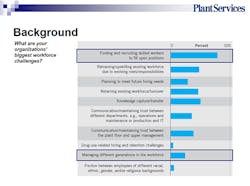“We always know that things need to be fixed”
Luke Clark is a reliability professional for Allied Reliability where he teaches clients about planning and scheduling, asset health and reliability, and CMMS. Jack Ferguson, seal reliability engineer for SEPCO, graduated from Clemson University with a degree in mechanical engineering. During the Q&A portion of the webinar, “Workforce Development: 12 Under 30— Thoughts from the Next Generation of Maintenance and Reliability Workers,” Clark and Ferguson spoke about their experience entering the industry.
PS: What aspects of maintenance reliability, specifically as a career, do you think make it attractive to workers under 30, and for people who are just starting out?
LC: I was in high school in 2008 when the recession happened and so I can speak for people around my age where we saw jobs go away and manufacturing companies go under or make massive cuts.
We saw the struggle of that and so there's a bit of a negative stigma, at least in my age group, where we saw manufacturing go under and it wasn't the bastion of safe jobs. So there's a lot of inherent distrust to that that comes from my generation. And then that piggybacks off of the fact that technology and software jobs right shortly after that just exploded. Manufacturing felt pretty far down the (career) list as far as people my age goes.
I say all that just to lay the groundwork for the fact that there's some hesitancy from people my age when it comes to jumping into this industry. How maintenance and reliability can quell that a little bit is that M&R specifically sits in a little bit of a bubble because it's “industry safe” in the sense that companies go under, industries go under, or they change and over time you don't even know what's going to happen, but we always know that things need to be fixed.
There are always going to be big pieces of equipment, moving parts, and we need to have people who have the knowledge of how we fix that and how do we keep it running. That's one thing I found interesting about this industry is that you could jump around from oil and gas automotive to food production, everywhere you go, there's pumps, there's valves, there's bearings. I mean, it really doesn't change much industry to industry. There'll be differences in how the company is structured and where people sit and there'll be some more people level differences, but the equipment doesn't change much.
How is it attractive for people under 30 is, one, it's a very unique field that you can sit in for manufacturing where it's a little bit protected from what happens economically. Two, there's the software aspect of it, where we have new technologies that are allowing us to get better in keeping these pieces of equipment running. You can be a part of bettering manufacturing is the way I look at it.
For my age group, where you may have some reluctance about what you had seen in the past for manufacturing that you see as maybe unstable, here's our opportunity to make it better in the future, use the technology that we grew up with and then use this opportunity to improve.
PS: Jack, you and Luke are about five years apart so that's probably not enough to make a big difference in how you perceive this industry, but I'm curious, from your perspective, what is it about maintenance and reliability as a career that you also think would make it attractive to workers under 30?
JF: Yeah. I agree with Luke here. He made some really good points. What I really enjoy about it and what attracted me to it was that flexibility and that opportunity to incorporate all this new technology that's coming in and that, we kind of grew up with. Computers and programming were part of my engineering training at Clemson and I really enjoy all that stuff.
Coming in and seeing opportunities to automate things and improve things with technology, make them more efficient, more productive, and kind of having that flexibility and opportunity to really grow things and improve things just kind of everywhere is really cool. It provides a lot of opportunity for learning and growth in industry for employees and it's just really exciting.
PS: Have you had any aha moments since the beginning of your career where you learn something exciting or gained clarity on a specific topic?
JF: Going into SEPCO where we make seals for pumps, bearing, isolators, and things like that, one of my first was, “Oh, pumps have to have seals?” Because in fluid dynamics when they're teaching it in a class, a pump is a circle on a piece of paper with certain parameters going in and certain parameters going out, and how the pump actually works is never really discussed.
In fairness, a lot of people probably won't ever deal with that, but at SEPCO where that's the main thing we deal with, I had to learn a lot about how pumps operate, the way they operate, the way the seal has to operate, the different conditions and products that pumps move.
There's a lot of learning to be done coming just right out of college, because college gives you a really high-level understanding of physical principles and engineering concepts. But once you get into the workforce and you get into your specific industry and company, you probably haven't covered it and so you've got to learn a lot.
PS: Luke, maybe we can ask you the same question. Can you talk about an aha moment that you had at some points during your career especially maybe at the start of it where you learned something exciting or gained clarity on something?
LC: One that hit me was early on. I got a lot of CMMS experience and worked with the tools and the technical aspect of it, so very quickly, that made sense to me, we have these tools we can utilize, and this should be integrated in our day to day.
Early on in my career, one of the aha moments was we focused so much on the tools themselves and we say, well, is this a good tool or is that a good tool? Very quickly I realized, sure, some CMMSs or some softwares or tools that we have out there are a little bit better, maybe more user-friendly. At the end of the day, it's really the people that you need to get the buy-in from.
I don't know if I can think of a single moment where I had that aha moment, but over time, it was just over and over when I would go into a project. It’s getting the buy-in for the whole idea of, hey, we're going to utilize these tools and your job isn't just to turn a wrench anymore. It is to actually improve for the next time. It's great that you know how to fix this broken piece of equipment, but the end-goal is that this broken piece of equipment doesn't break nearly as often, if ever again. The goal is to keep working towards not having breakdowns. At least not unexpected breakdowns.


